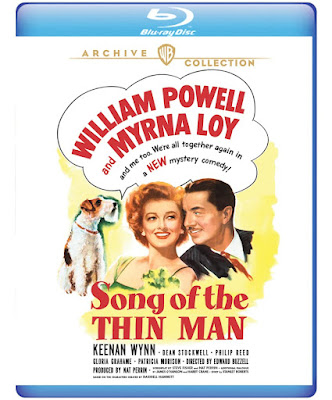I had a blast watching a pair of spooky season favorites on new Blu-rays from Warner Archive. It was great to see two films I love looking and sounding as good as new.
Director Tod Browning’s (Dracula, Freaks) Mark of the Vampire (1935) is most famous for an outrageous twist, one that alters the film so dramatically that I thought I’d never be able to watch it again after my first viewing. Instead it has become a favorite spooky season watch, because it has a lot more going for it than plot.
The cast of spooks is top notch, with the moody Carroll Borland an especially striking presence as the ultimate 1930s Goth girl, years before Vampira and Elvira. There’s also Bela Lugosi, still giving everything to his Dracula-style character after finding worldwide fame as the character in the 1930 Universal adaptation of the Bram Stoker novel.
I also appreciate the creativity behind the set and sound design. The whistling, moaning, ambience of the film’s soundtrack remains chillingly eerie to this day. By using a multi-layered soundscape instead of music, the movie evokes a more timeless feel. There’s also a great juxtaposition between the luxurious estate at the center of the daylight action and the cobweb and animal-filled castle down the road that comes to life at dusk.
The central plot, about murder, an inheritance, and its beneficiary is essentially something to endure until you can get to the ghouls, though Lionel Barrymore and Leila Bennett contribute a great sense of camp. Mark of the Vampire is at its best when it is dialogue-free, with that creepy soundtrack casting its spell. Even though the meaning of everything is altered in the end, the sight of a moody, ghoulish Carol glowering at passerby and wandering in the dark, Lugosi grimacing, and spiders slithering up the wall are all great fun. I appreciated how well the sound and image were engineered for the Blu-ray, because those elements are especially important in a film like this one.
Special features on the disc included commentary from Kim Newman and Stephen Jones, a theatrical trailer, the short A Thrill for Thelma, and the cartoon The Calico Dragon.
The 1931 version of Dr. Jekyll and Mr. Hyde is one of the most beautifully-crafted films of the pre-Code era thanks to the deliberate work of director Rouben Mamoulian (Queen Christina, Silk Stockings).
It’s a shame that actors are so rarely rewarded for their work in horror. In the title role(s) Fredric March more than earned his Academy Award for Best Actor in a Leading Role. Though he was at the beginning of a stunning career, it remains one of his most masterful performances, because he shows a deep understanding of the complex duality of his role.
Maumoulian begins his film by showing the way Dr. Jekyll is perceived by the world. He uses a first person perspective to show him interacting with his deferential servants. Then he dramatically switches the camera to March, capturing his own appreciative self-regard before the look is mirrored in his audience at a lecture. In a few minutes you understand how important his reputation is to him and how much is at stake in this society that reveres him.
One of Mamoulian’s most effective visual techniques is in the use of superimposition of images to mirror the passions in Jekyll/Hyde. He creates a sort of dreamlike mood as the doctor’s obsessions intertwine with his transformation into Hyde. It effectively puts the viewer both a little on edge and into Hyde/Jekyll’s thoughts.
March’s acting in the transformation scenes is equally unsettling. In some respects he keeps it low-key, but his quiet, animalistic groans of pain have visceral power. It’s a stunning contrast to the elegance of his public persona; though you can see elements of that pain growing in him no matter how refined he aspires to appear. When the dam bursts and he is fully in Hyde mode, he embraces his newfound freedom with a mixture of joy and relief.
As the unfortunate showgirl Ivy who is the victim of Hyde’s lustful abuse, Miriam Hopkins balances playful sensuality with tightly-wound terror. She immediately shrinks from Hyde as if from a wild animal, aware of the danger because it is an intensification of the peril in her daily life. It is heartrending to witness her horror of him. While this is an over-the-top performance, it captures pure fear; Hopkins was as deserving of an Oscar as her costar.
This adaptation of Dr. Jekyll and Mr. Hyde remains one of the best horror films ever made. Its terror is timelessly potent.
Special features on the disc include a commentary by Dr. Steve Haberman and Constantine Nasr, a second commentary by Greg Monk, the cartoon Hyde and Hare, and a Theatre Guild on the Air radio broadcast of the story.
Many thanks to Warner Archive for providing copies of the films for review.























